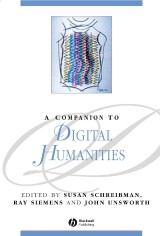Details

A Companion to Digital Humanities
Blackwell Companions to Literature and Culture 1. Aufl.
|
46,99 € |
|
| Verlag: | Wiley-Blackwell |
| Format: | |
| Veröffentl.: | 15.04.2008 |
| ISBN/EAN: | 9780470999868 |
| Sprache: | englisch |
| Anzahl Seiten: | 640 |
DRM-geschütztes eBook, Sie benötigen z.B. Adobe Digital Editions und eine Adobe ID zum Lesen.
Beschreibungen
<p><b>This <i>Companion</i> offers a thorough, concise overview of the emerging field of humanities computing.</b></p> <ul> <li>Contains 37 original articles written by leaders in the field.</li> <li>Addresses the central concerns shared by those interested in the subject.</li> <li>Major sections focus on the experience of particular disciplines in applying computational methods to research problems; the basic principles of humanities computing; specific applications and methods; and production, dissemination and archiving.</li> <li>Accompanied by a website featuring supplementary materials, standard readings in the field and essays to be included in future editions of the Companion.</li> </ul>
<p>Notes on Contributors viii</p> <p>Foreword: Perspectives on the Digital Humanities xvi<br /><i>Roberto A. Busa</i></p> <p>The Digital Humanities and Humanities Computing: An Introduction xxiii<br /><i>Susan Schreibman, Ray Siemens, and John Unsworth</i></p> <p><b>PART I History</b></p> <p>1 The History of Humanities Computing 3<br /><i>Susan Hockey</i></p> <p>2 Computing for Archaeologists 20<br /><i>Harrison Eiteljorg, II</i></p> <p>3 Art History 31<br /><i>Michael Greenhalgh</i></p> <p>4 Classics and the Computer: An End of the History 46<br /><i>Greg Crane</i></p> <p>5 Computing and the Historical Imagination 56<br /><i>William G. Thomas, III</i></p> <p>6 Lexicography 69<br /><i>Russon Wooldridge</i></p> <p>7 Linguistics Meets Exact Sciences 79<br /><i>Jan Haji<i>č</i></i></p> <p>8 Literary Studies 88<br /><i>Thomas Rommel</i></p> <p>9 Music 97<br /><i>Ichiro Fujinaga and Susan Forscher Weiss</i></p> <p>10 Multimedia 108<br /><i>Geoffrey Rockwell and Andrew Mactavish</i></p> <p>11 Performing Arts 121<br /><i>David Z. Saltz</i></p> <p>12 ‘‘Revolution? What Revolution?’’ Successes and Limits of Computing Technologies in Philosophy and Religion 132<br /><i>Charles Ess</i></p> <p><b>PART II Principles</b></p> <p>13 How the Computer Works 145<br /><i>Andrea Laue</i></p> <p>14 Classification and its Structures 161<br /><i>C. M. Sperberg-McQueen</i></p> <p>15 Databases 177<br /><i>Stephen Ramsay</i></p> <p>16 Marking Texts of Many Dimensions 198<br /><i>Jerome McGann</i></p> <p>17 Text Encoding 218<br /><i>Allen H. Renear</i></p> <p>18 Electronic Texts: Audiences and Purposes 240<br /><i>Perry Willett</i></p> <p>19 Modeling: A Study in Words and Meanings 254<br /><i>Willard McCarty</i></p> <p><b>PART III Applications</b></p> <p>20 Stylistic Analysis and Authorship Studies 273<br /><i>Hugh Craig</i></p> <p>21 Preparation and Analysis of Linguistic Corpora 289<br /><i>Nancy Ide</i></p> <p>22 Electronic Scholarly Editing 306<br /><i>Martha Nell Smith</i></p> <p>23 Textual Analysis 323<br /><i>John Burrows</i></p> <p>24 Thematic Research Collections 348<br /><i>Carole L. Palmer</i></p> <p>25 Print Scholarship and Digital Resources 366<br /><i>Claire Warwick</i></p> <p>26 Digital Media and the Analysis of Film 383<br /><i>Robert Kolker</i></p> <p>27 Cognitive Stylistics and the Literary Imagination 397<br /><i>Ian Lancashire</i></p> <p>28 Multivariant Narratives 415<br /><i>Marie-Laure Ryan</i></p> <p>29 Speculative Computing: Aesthetic Provocations in Humanities Computing 431<br /><i>Johanna Drucker (and Bethany Nowviskie)</i></p> <p>30 Robotic Poetics 448<br /><i>William Winder</i></p> <p><b>PART IV Production, Dissemination, Archiving</b></p> <p>31 Designing Sustainable Projects and Publications 471<br /><i>Daniel V. Pitti</i></p> <p>32 Conversion of Primary Sources 488<br /><i>Marilyn Deegan and Simon Tanner</i></p> <p>33 Text Tools 505<br /><i>John Bradley</i></p> <p>34 ‘‘So the Colors Cover the Wires’’: Interface, Aesthetics, and Usability 523<br /><i>Matthew G. Kirschenbaum</i></p> <p>35 Intermediation and its Malcontents: Validating Professionalism in the Age of Raw Dissemination 543<br /><i>Michael Jensen</i></p> <p>36 The Past, Present, and Future of Digital Libraries 557<br /><i>Howard Besser</i></p> <p>37 Preservation 576<br /><i>Abby Smith</i></p> <p>Index 592</p>
“Offers the best general introduction to this amorphous field.” <b><i>Literary Research Guide<br /></i></b> <p>“The book represents a turning point for the Digital Humanities by bringing together a wide range of expertise from both theorists and practitioners and demonstrating that this can be considered a field in its own right … As an overview of a diverse field, [it] provides a detailed, useful introduction to how computational technologies have and may be appropriated, utilised and even innovated by humanities scholars.” <i><b>The Classical Review</b></i></p>
<b>Susan Schreibman</b> is Assistant Director of Maryland Institute for Technology in the Humanities at the University of Maryland, a faculty member of the University of Maryland Libraries, and Affiliate Faculty in the Department of English. Her recent publications include <i>Computer-Mediated Discourse: Reception Theory and Versioning</i> and ongoing work on the Thomas MacGreevy Archive.<br /> <p><b>Ray Siemens</b> is Canada Research Chair in Humanities Computing and Associate Professor of English at the University of Victoria. Formerly he was Professor of English at Malaspina University-College and Visiting Senior Research Fellow at the Centre for Computing in the Humanities at King's College London. Founding editor of the electronic scholarly journal <i>Early Modern Literary Studies</i>, he is also editor of several Renaissance texts and coeditor of several collections on humanities computing topics.<br /> </p> <p><b>John Unsworth</b> is Dean of the Graduate School of Library and Information Science at the University of Illinois, Urbana-Champaign. He is founding coeditor of <i>Postmodern Culture,</i> an e-journal, and founding Director of the University of Virginia’s Institute for Advanced Technology in the Humanities.</p>
<i>A Companion to Digital Humanities</i> provides a complete yet concise overview of this emerging discipline. The volume contains 37 original articles written by leaders in the field, addressing the central concerns of those interested in the subject. The articles are grouped into topical sections focusing on the experience of particular disciplines in applying computational methods to humanities research problems; the basic principles of humanities computing across applications and disciplines; specific applications and methods; and production, dissemination, and archiving.<br /> <p>The <i>Companion</i> is accompanied by a website that will evolve with its readership, featuring useful supplementary materials, standard readings that are publicly available, essays to be included in future editions, and other materials -- visit www.ach.org/companion.<br /> </p>
“Offers the best general introduction to this amorphous field.”<br /> <i>Literary Research Guide</i>
Diese Produkte könnten Sie auch interessieren:

The Handbook of Hispanic Linguistics

von: José Ignacio Hualde, Antxon Olarrea, Erin O'Rourke

46,99 €

A Companion to Lesbian, Gay, Bisexual, Transgender, and Queer Studies

von: George E. Haggerty, Molly McGarry

38,99 €














